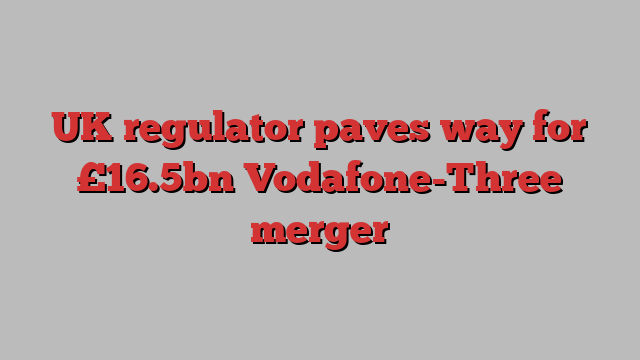
Unlock the Editor’s Digest for free
Roula Khalaf, Editor of the FT, selects her favourite stories in this weekly newsletter.
The UK competition regulator has paved the way for the £16.5bn domestic merger of Vodafone and CK Hutchison’s Three UK as long as the companies address competition concerns.
The Competition and Markets Authority on Tuesday said the planned tie-up could proceed if the companies committed to delivering on their £11bn plans to upgrade the merged company’s UK network, including the rollout of 5G.
The CMA’s announcement comes after the regulator said in September that the merger could lead to higher bills for tens of millions of customers and demanded changes if the deal were to go ahead.
The tie-up, first announced in 2023, would reduce the number of operators in the UK from four to three and is expected to create Britain’s largest mobile operator if it gains approval.
The proposed remedies include retaining certain existing mobile tariffs and data plans for three years, as well as pre-agreed prices and contract terms for mobile virtual network operators (MVNOs).
They also require the companies to deliver their joint network plan over the next eight years, which would be a legal obligation overseen by UK communications regulator Ofcom and the CMA.
The watchdog is seeking feedback on its remedies working paper before a final December 7 decision deadline. The companies in a joint statement said they believed the CMA’s communication provided “a path to final clearance”.
“An appropriate balance appears to have been struck by ensuring that the significant benefits of the merged company’s investments can be realised in full and at pace to the benefit of the country and its citizens, while addressing the CMA’s stated concerns,” the two companies said.
However, they added it was “essential that balance is preserved through to the end of the process, reflecting that the parties have offered extensive remedies, including by making their future network rollout fully enforceable”.
The companies in September offered concessions such as limiting price increases on some phone tariffs for two years and allowing MVNOs with 2.5mn or fewer customers to access its network on pre-agreed terms for three years.
Margherita Della Valle, Vodafone’s chief executive, said at the time of the CMA’s provisional findings that the companies had volunteered for their £11bn investment plan to be monitored and would be “more than happy” for it to be enforced by Ofcom.
“We believe this deal has the potential to be pro-competitive for the UK mobile sector if our concerns are addressed,” Stuart McIntosh, chair of the CMA’s inquiry group leading the merger investigation, said in a statement.
“Our provisional view is that binding commitments combined with short-term protections for consumers and wholesale providers would address our concerns while preserving the benefits of this merger,” he added.
Matthew Howett, founder and chief executive of Assembly Research, said the regulator “now seems convinced that the remedies offered will address any competition concerns they had — while also still allowing for the benefits of the merger [to] play out”.